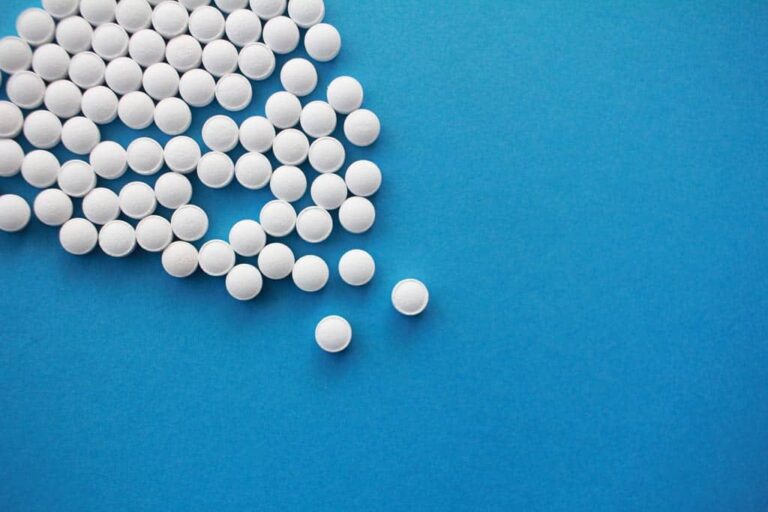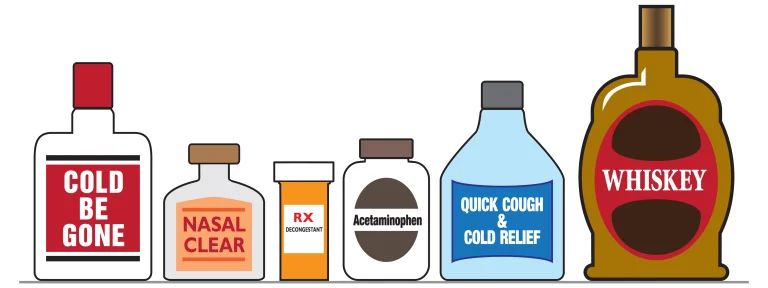Combining NyQuil and alcohol is a dangerous practice that can have serious health repercussions. NyQuil is a popular over-the-counter medication that alleviates cold symptoms, including…
Combining NyQuil and alcohol is a dangerous practice that can have serious health repercussions. NyQuil is a popular over-the-counter medication that alleviates cold symptoms, including sore throat, cough, and nasal congestion. It contains an active ingredient called dextromethorphan which acts as a cough suppressant, pain reliever, and antihistamine. Alcohol, on the other hand, is a depressant that can cause impaired judgment, loss of coordination, and sedative effects.
The purpose of NyQuil is to provide relief when you’re sick, not to be used as a recreational substance. Unfortunately, many people mix the two substances, thinking it will enhance the effects of the medication or help them relax. However, mixing NyQuil and alcohol can lead to severe liver damage, impaired cognitive function, and even death in extreme cases. The alcohol in NyQuil can also worsen cold symptoms and cause stomach upset and loss of appetite.
You must know that medical professionals have raised concerns about the prevalence of people mixing NyQuil and alcohol. This dangerous practice can have adverse effects, especially for those individuals with a history of alcohol use disorder, prescription medications, or mental health issues. If you experience any short-term or dangerous side effects after taking NyQuil with alcohol, seek medical attention immediately.
While it is already clear that you should not consume alcohol while currently taking NyQuil since they make a dangerous combination, there is still more to know. So, keep reading to see further information.
Purpose of NyQuil

NyQuil has been a popular choice for many individuals searching for an effective method to manage their cold symptoms over the years.
NyQuil works by combining different active ingredients that target different symptoms. For instance, the medication has antihistamines that help to relieve nasal congestion and runny nose. It also contains a pain reliever to manage headaches, fever, and body aches. The presence of a cough suppressant in NyQuil also helps to alleviate cough symptoms.
Moreover, NyQuil is available in various forms to suit the preference of individuals. There are capsules, tablets, and the liquid form. The liquid form is a relief liquid that is typically easier to administer, and it is commonly preferred by those with a sore throat or nasal congestion. The alcohol-free version is also available for individuals who cannot drink or choose not to consume alcohol.
Alcohol and Its Effects

Alcohol consumption can affect the body and mental state in various ways. Many individuals experience symptoms like impaired judgment, elevated heart rate, and stomach upset after consuming alcohol. However, the dangers of alcohol consumption go beyond these short-term effects.
Heavy drinking and alcohol use disorder can lead to several long-term health risks, including severe liver damage, loss of coordination, and rapid heart rate. It can also affect the production of white blood cells, leading to a weakened immune system and increased vulnerability to infections.
When alcohol is mixed with medication like NyQuil, the potential danger increases significantly. NyQuil is a cold medication that contains alcohol, and it can cause adverse effects when combined with alcohol consumption. The sedative effects of NyQuil are amplified when taken with alcohol, leading to impaired judgment, loss of coordination, and severe liver damage.
Medical professionals advise against alcohol consumption while on medication like NyQuil because of its potential to be life-threatening. It’s also crucial to note that drug interactions can occur between alcohol and prescription medications, leading to dangerous side effects.
NyQuil and Alcohol Side Effects
No one can get away from taking the mix of NyQuil and alcohol because the deadly combination can produce undesirable side effects, and they even depend on the amount taken or if they are repeatedly taken. One to two drinks may not need too much concern for others, while some can already experience mild but non-threatening side effects.
For instance, short-term side effects may include:
- stomach upset
- blurred vision
- confusion
- dizziness
- increased heart rate
- abdominal pain
- increased blood pressure
- coordination issues
- increased drowsiness
- dry mouth, eyes, or nose
- mild rashes
- impaired judgment
- reduced inhibitions
- impaired decision-making abilities
- restlessness
- loss of appetite
If you’ve consumed a large amount of alcohol while taking Nyquil and have taken them repeatedly, the common side effects are more severe:
- mood and behavior changes
- impairments with the immune system
- cardiovascular problems
- coordination and cognitive impairments
- pancreas impairments
- liver problems
- development of certain cancers
Moreover, taking more than the recommended dose of NyQuil can lead to a fatal overdosing that may experience seizures, anxiety, hallucinations, hyperactivity, or dilated pupils. On the other hand, some who constantly combine NyQuil and alcohol will have impairments in the liver. That’s why there are serious warnings about them.
Dangers of Mixing NyQuil and Alcohol

Mixing NyQuil and alcohol is not only dangerous but can also be life-threatening. The deadly combination can lead to the following danger:
- Addiction
- Impaired immune system
- Liver damage or failure
- Increased risk for overdose
- Increased risk of accidental death
NyQuil contains acetaminophen, which is already hard on the liver. Combining it with alcohol, which is also dangerous to the liver, can lead to severe liver damage or even an overdose.
Besides the potential harm to the liver, alcohol can also make the symptoms of a cold or the flu even worse. When you’re sick, you may experience headaches, fatigue, and a dry mouth, and alcohol can exacerbate these symptoms. Moreover, alcohol can impair your immune system, which means that drinking while sick could actually prolong your illness.
Medical professionals strongly advise against consuming alcohol while you’re battling an illness, especially if you’re taking medication like NyQuil that already puts a strain on your liver. It is always better for your overall well-being to prioritize your health and avoid any unnecessary risks for long-term health problems.
Let’s explore some of the dangers below.
Severe Liver Damage
Severe liver damage is a known danger when mixing NyQuil with alcohol. The active ingredient in NyQuil, acetaminophen, can cause toxicity to the liver when taken in high doses or mixed with alcohol. The liver is the vital organ in charge of metabolizing alcohol and medication. However, when both substances are consumed simultaneously, the liver becomes overwhelmed, leading to liver damage.
To avoid severe liver damage, it is essential to read the NyQuil product label carefully and ensure that the NyQuil products do not contain any alcohol. Some versions of NyQuil are alcohol-free, making them a safe option to take with other medications or alcohol. If alcohol consumption is unavoidable, choose a non-alcohol-based cold medication that does not contain acetaminophen to avoid overexposing your liver to toxic substances.
It is crucial to limit alcohol consumption while taking NyQuil as it will increase the risk of liver damage. Exceeding the recommended dosage of NyQuil or drinking too much alcohol while on the medication can also lead to liver damage. Therefore, it’s recommended to follow the instructions on the label and seek medical attention if you experience any symptoms of liver damage.
Sedative Effects from Combination Use
Combining NyQuil and alcohol can have potential sedative effects on the body. Both NyQuil and alcohol act as depressants, meaning their use can slow down activity in the central nervous system. This can result in increased drowsiness and impaired motor function.
NyQuil contains an antihistamine called diphenhydramine, which has sedative properties. When taken alone, diphenhydramine can cause drowsiness and impair cognitive function. When combined with alcohol, its sedative effects can be intensified, leading to greater drowsiness and impaired motor function.
Alcohol can also exacerbate the sedative effects of other ingredients in NyQuil, such as acetaminophen and dextromethorphan. These substances can cause drowsiness on their own, but when combined with alcohol, the sedative effects can be further amplified.
Factors such as individual health conditions and dosage can also play a critical part in the intensity of sedative effects. People with liver disease or other medical conditions may be much more sensitive to the sedative effects of NyQuil and alcohol. Additionally, taking higher doses of NyQuil or consuming large amounts of alcohol can intensify sedative effects and increase the risk of impairment.
Rapid Heart Rate and High Blood Pressure
Mixing NyQuil and alcohol can potentially have negative effects on heart rate and blood pressure. Alcohol consumption can cause a temporary spike in blood pressure and heart rate, while the antihistamine diphenhydramine found in NyQuil can also lead to an elevated heart rate.
When NyQuil and alcohol are combined, their sedative effects can intensify and potentially cause dizziness, confusion, and impaired judgment. This impaired judgment can lead to individuals taking more NyQuil or consuming more alcohol, intensifying the effects on heart rate and blood pressure.
Mixing alcohol and NyQuil can increase the risks of negative side effects, particularly in individuals with preexisting heart conditions or hypertension. The sedative effects of NyQuil and alcohol can also cause relaxation of blood vessels, leading to a drop in blood pressure. This drop in blood pressure can be problematic for individuals taking medication to regulate their blood pressure.
Loss of Coordination and Appetite
Besides rapid heart rate and high blood pressure, combining NyQuil and alcohol can also lead to a loss of coordination and appetite, which can be particularly dangerous. Loss of coordination can cause individuals to stumble, fall, or experience difficulty with balance and movement, while a loss of appetite can cause weakness and fatigue. Thus, increasing the risk of accidents or injuries.
All in all, with the number of possible side effects, you should never attempt mixing NyQuil and alcohol, as it only comes with one result: danger.
Alcohol and NyQuil Addiction

Mixing alcohol and NyQuil increases the potential for addiction. NyQuil contains a sedative effect that can be intensified when combined with alcohol. Frequent use of this combination can lead to physical and psychological dependency.
Physical dependency occurs when the body adapts to the presence of the substances and experiences withdrawal symptoms when they are removed. In the case of mixing alcohol and NyQuil, withdrawal can result in symptoms such as tremors, sweating, nausea, and heightened anxiety.
Psychological dependency occurs when the mind relies on substances to manage emotions or cope with stress. Individuals may begin to crave the sedative effects produced by NyQuil and alcohol to numb feelings of anxiety, depression, or other negative emotions. Over time, this can lead to compulsive use, loss of control, and difficulty quitting.
Other Medications to Avoid While Taking NyQuil
When taking NyQuil, it is important to be aware of other medications that may interact negatively with its active ingredients. Drug interactions can lead to dangerous side effects and adverse reactions, which is why it is necessary to consult with a healthcare provider or pharmacist before taking any new medications while using NyQuil.
The following are some common medications to avoid while taking NyQuil:
- Sedatives
One group of medications that can potentially interact with NyQuil is sedatives. These include medications like benzodiazepines, barbiturates, and sleep aids. Combining sedatives with NyQuil may increase the sedative effects of both drugs, leading to excessive drowsiness, confusion, and slowed breathing. This combination can be particularly dangerous for older adults or individuals with respiratory issues.
- Anti-depressants
Some anti-depressants, like MAO inhibitors, can increase the risk of severe, even life-threatening, reactions when combined with NyQuil. Other anti-depressants may increase the risk of serotonin syndrome when taken with NyQuil, leading to symptoms such as confusion, rapid heart rate, and elevated body temperature.
- Blood pressure medications
Certain blood pressure medications, like alpha blockers and beta blockers, may have dangerous interactions with NyQuil. This can result to drastic changes in blood pressure, which may result in lightheadedness or fainting.
- Muscle relaxants
Combining NyQuil with muscle relaxants can lead to severe sedative effects, causing drowsiness, confusion, and loss of coordination. It may also lead to impaired judgment and difficulty performing everyday tasks.
- Some over-the-counter medications
Over-the-counter medications, such as cough syrups, nasal decongestants, and pain relievers, may also interact negatively with NyQuil. It is necessary to check and read the labels of all medications and to consult with a healthcare provider or pharmacist to avoid potential drug interactions.
Medications to Avoid Mixing with Alcohol
Similar to NyQuil, there are various over-the-counter cold and flu medications and prescription drugs that should be avoided when consuming alcohol. Here are some medications to avoid mixing with alcohol:
- Prescription medications
Prescription medications such as Ambien, Xanax, and Valium can also have dangerous interactions with alcohol. These types of medications belong to the class of drugs called benzodiazepines. Specifically, they are used to treat anxiety, insomnia, and other conditions. When combined with alcohol, the sedative effects of these drugs can be amplified, leading to impaired judgment, loss of coordination, slowed breathing, and even respiratory failure.
- Sedatives
The combination of sedatives and alcohol can slow down breathing, heart rate, and blood pressure. This can lead to unconsciousness, coma, and even death in severe cases. For that reason, the dangers of mixing alcohol with these medications should not be overlooked.
In summary, when it comes to cold medications, prescription drugs, or any other medication containing sedative ingredients, it is crucial to always exercise caution and avoid mixing them with alcohol. The potential for dangerous interactions is always a risk, and it is better to be on the side of caution when your health and safety are the concerns.
Frequently Asked Questions
This FAQ section aims to provide further information relevant to NyQuil and alcohol. Explore below to learn more.
How long after taking NyQuil is it safe to drink alcohol?
It is recommended to wait at least 4-6 hours after taking DayQuil before consuming alcohol. This is because DayQuil contains active ingredients such as antihistamines, acetaminophen, and dextromethorphan, which can cause drowsiness, dizziness, and impair your ability to operate heavy machinery or drive a car. Alcohol can enhance these effects and increase the threat of side effects such as nausea, dizziness, and loss of coordination. Therefore, it is recommended to avoid mixing DayQuil and alcohol, especially if you need to drive a car or operate heavy machinery.
While there is a general waiting time, it may still vary depending on the individual, the dosage of DayQuil consumed, and other factors such as body weight and age. To determine a safe time frame, it is always best to consult with a medical professional or healthcare provider.
What happens if you mix Sprite and NyQuil?
When Nyquil is mixed with Sprite, the sedative effects of Nyquil can be amplified, leading to impaired judgment, loss of coordination, and drowsiness. This can be especially dangerous in times you need to drive or operate heavy machinery.
In addition to the sedative effects, mixing Sprite and Nyquil can also cause short-term side effects such as upset stomach, nausea, and headaches.
Therefore, it is important to avoid mixing Sprite or any other sugary beverage with Nyquil. Instead, it is recommended to take Nyquil with water or a clear non-alcoholic beverage. Always check and read the label and follow the recommended dosage of Nyquil to avoid any adverse effects.
How long does NyQuil stay in the system compared with alcohol?
Several factors can influence the duration of NyQuil and alcohol in the system. For example, the liver function plays a significant role in how long it takes for these substances to be processed and removed from the body. Age, weight, and other chronic health conditions can also impact how long these substances stay in the system.
Typically, NyQuil can stay in your system for 24 hours. The active ingredient in NyQuil, diphenhydramine, takes about six hours to leave your system. On the other hand, alcohol can stay in your system for much longer. It is typically detectable in your blood any hour until 12 hours after your last drink. However, it can remain in your urine for up to 24 hours and in your hair for up to 90 days.
Is NyQuil bad for your liver?
One of the primary active ingredients in NyQuil is acetaminophen, a pain reliever that is also found in other over-the-counter medications. When taken in high doses, acetaminophen can cause liver damage, even possibly leading to liver failure. This is because the liver metabolizes acetaminophen into a compound that can be extremely harmful in large amounts.
The risk of liver damage from NyQuil is heightened when combined with alcohol, which is also known to cause liver damage when consumed in excess. When taken together, the liver must work to metabolize both substances, increasing the strain on the organ and potentially leading to severe liver damage over time.
To safely take NyQuil without causing damage to your liver, it’s important to follow proper dosing instructions. Remember to never take more than the recommended dose or take it more frequently than instructed.
Which NyQuil products do not have alcohol?
While some NyQuil products contain alcohol, there are also alcohol-free options available on the market. Here are the alcohol-free NyQuil products:
NyQuil Cough
NyQuil Cough is a medication designed to treat cough and other cold symptoms. It is a non-drowsy formula that does not contain alcohol. Besides relieving the common cold and cough symptoms, NyQuil Cough also contains acetaminophen, a pain reliever that helps ease body aches and pains caused by the common cold.
NyQuil HBP
NyQuil HBP is an alcohol-free medication that is specifically developed for people with high blood pressure. It contains a decongestant to relieve nasal congestion and other cold symptoms. Additionally, NyQuil HBP does not contain antihistamines, which can increase blood pressure. That’s why it is considered a safe and effective option for individuals looking for cold and flu relief medication that does not contain alcohol.
Alcohol-Free NyQuil Cold & Flu Relief Liquid
As the name suggests, Alcohol-Free NyQuil Cold & Flu Relief Liquid is a medication that provides relief from the common cold and flu symptoms without containing alcohol. It contains a combination of ingredients, including acetaminophen, dextromethorphan, and doxylamine succinate, which work together to relieve cough, sore throat, runny nose, and other cold symptoms.
Does taking NyQuil make you tired until the next day?
Did you take NyQuil before bed and woke up feeling groggy the next day? You’re not alone. One of the most common NyQuil side effects is drowsiness. While it helps provide relief from cold symptoms such as cough and stuffy nose, it can leave you feeling sluggish, groggy, and tired the next day.
NyQuil’s sedative effects, which are intended to help you sleep through the night, can linger into the next day and make it harder to wake up in the morning. The likelihood of experiencing this drowsy effect increases if NyQuil is combined with alcohol.
Is NyQuil addictive?
One common concern regarding NyQuil is whether or not it is addictive. While the active ingredients in NyQuil can lead to dependence, it’s important to understand the difference between dependence and addiction.
Dependence refers to the physical or psychological reliance on a substance, where the body has become accustomed to its presence and may experience withdrawal symptoms if use were to be abruptly stopped. Addiction, on the other hand, involves compulsive and uncontrollable drug-seeking behavior, even in the face of negative consequences.
Common signs of addiction may include:
– Using more NyQuil than intended
– Cravings or urges to use NyQuil
– Spending excessive amounts of time obtaining or using NyQuil
– Neglecting responsibilities in order to use NyQuil
– Continuing to use NyQuil despite negative consequences such as relationship issues, job loss, or legal problems
Now, if you suspect that you, someone you know, or your loved one may have an addiction to NyQuil, seek help from Costa Rica Treatment Center and get a free evaluation immediately.
Final Thoughts
Indeed, mixing NyQuil and alcohol is a dangerous game that’s not worth playing. The potential risks to your health and well-being just aren’t worth it. Remember that if you’re feeling sick, stick to one remedy at a time and always read the label before taking any medication. Your health, well-being, and safety should always be your top priority. Otherwise, your well-being will be at risk.
If you have already taken the deadly combination, make sure you observe the signs of a potential overdose. Don’t hesitate to seek immediate treatment. Remember that Costa Rica Treatment Center can help you in many ways, such as alcohol addiction treatment. Make sure to contact us to learn further information about our treatment services, admission, and many more.








